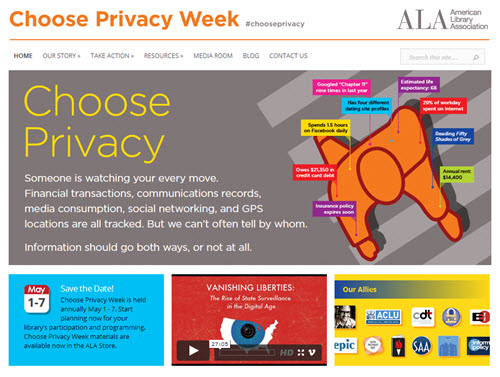Open and Shut: Privacy and Data Literacy for Library Staff
 Since the early twentieth century, public libraries across the United States have defended the privacy rights of its patrons.
Since the early twentieth century, public libraries across the United States have defended the privacy rights of its patrons.
Yet, as networked digital tools become more sophisticated at collecting, storing, and sharing information about us, patrons’ privacy needs are changing—and putting pressure on library professionals to respond to new challenges. Together with the Metropolitan New York Library Council, my organization—the New America Foundation’s Open Technology Institute—aims to meet those needs with a proposed project on privacy and data literacy for library staff.
The goal is quite simple: engage frontline staff—especially those librarians that work with vulnerable populations—in education, awareness, and skills training so they can support meaningful digital inclusion of their patrons. In doing this work, we hope to establish some baseline standards and baseline practices for community anchor institutions providing public computers and Internet access.
The idea originated from research I completed at OTI last year. In looking across several digital literacy organizations—including a large metropolitan library system, I found that frontline staff felt ill equipped to field patrons’ questions about privacy protection as they navigate the Web. Some staff didn’t know how cookies worked, what phishing was, or how algorithms functioned. Others didn’t know what tools help protect individuals’ personal transactions and communications. A few shared stories of being duped and having their identities stolen.
 Library staff also talked about not knowing who handled data as it traveled from one point to the next on the Internet. The inability to provide easy explanations contributed to the vulnerability of many patrons who, for example, often divulged personal information while seeking assistance in setting up an email account, plugging in a credit card to pay for a much-needed service, or renewing eligibility in a public assistance program. Staff wished they could better advise patrons, whether in the context of teaching the basics about the Internet or fielding questions on the floor.
Library staff also talked about not knowing who handled data as it traveled from one point to the next on the Internet. The inability to provide easy explanations contributed to the vulnerability of many patrons who, for example, often divulged personal information while seeking assistance in setting up an email account, plugging in a credit card to pay for a much-needed service, or renewing eligibility in a public assistance program. Staff wished they could better advise patrons, whether in the context of teaching the basics about the Internet or fielding questions on the floor.
Currently, there is a dearth of hands-on programs for privacy and data literacy for library professionals. Though libraries can benefit from resources like ALA’s Choose Privacy campaign, a more hands-on program is also in order. And METRO—a library council that has offered professional training for nearly fifty years—can provide that hands-on environment. Libraries need better knowledge, tools, and techniques to support patrons as they try to steer patrons away from predatory, discriminatory, or exploitative situations that jeopardize digital opportunities.
Unfortunately, most policy debates on digital inclusion have left privacy and data protection out of the conversation of digital opportunities and broadband impacts. It’s time to change that. With our planned collaboration, OTI and METRO hopes to bring much needed attention to the topic and grow the capacity of library professionals to support healthy digital inclusion for all.
Seeta Peña Gangadharan is a Senior Research Fellow at the Open Technology Institute.
